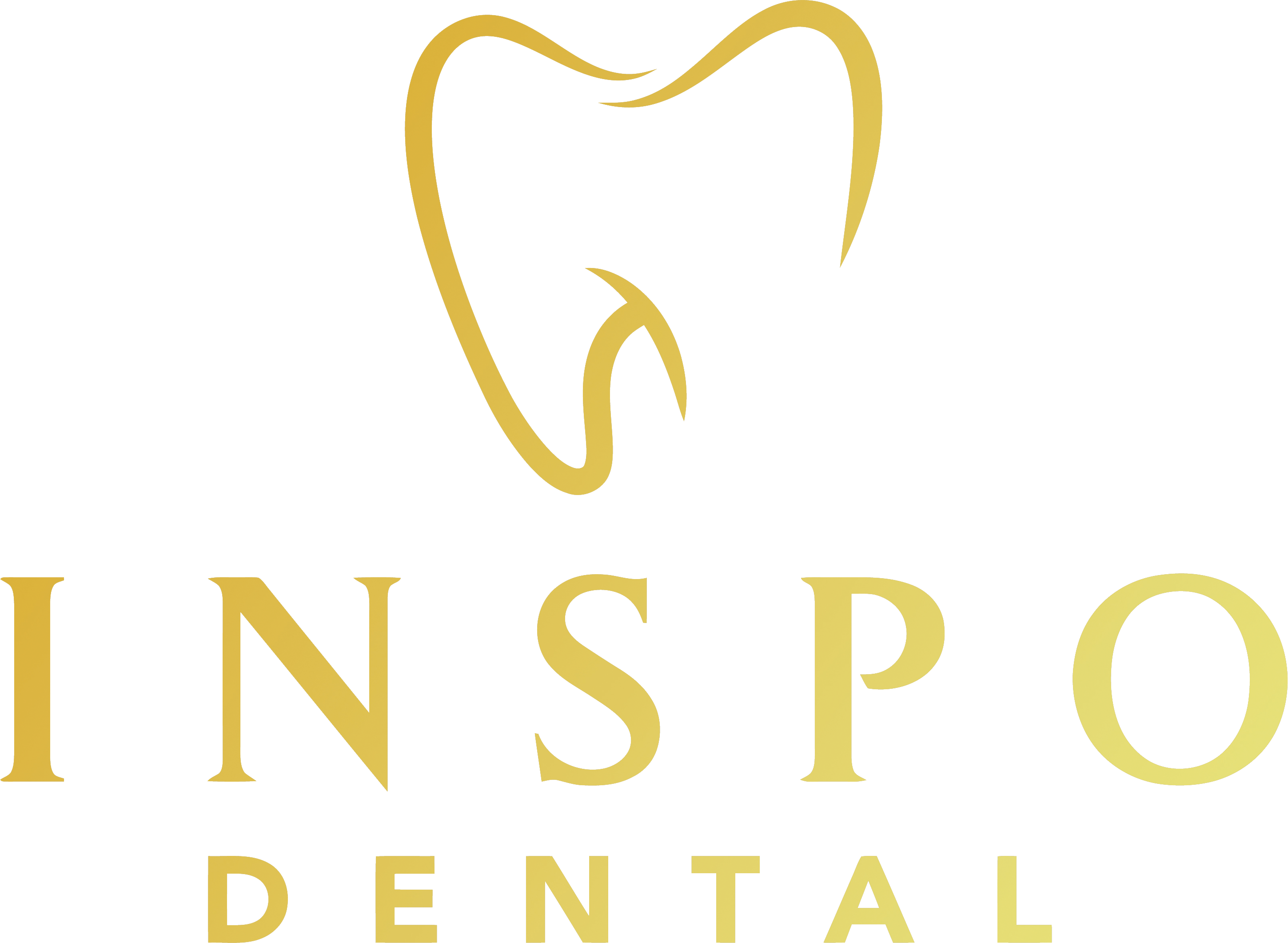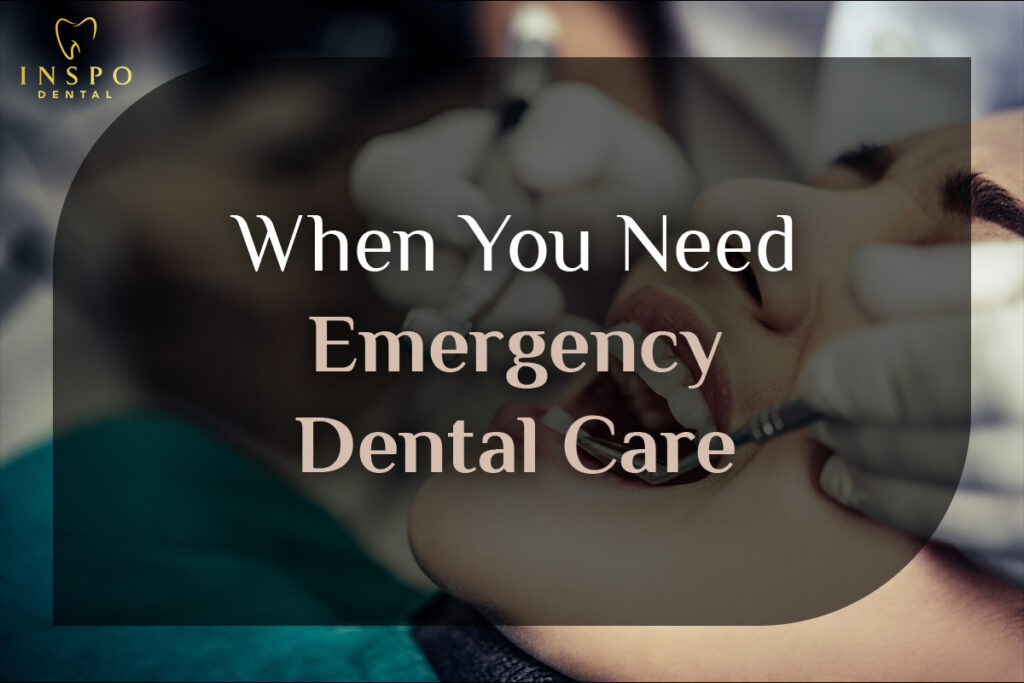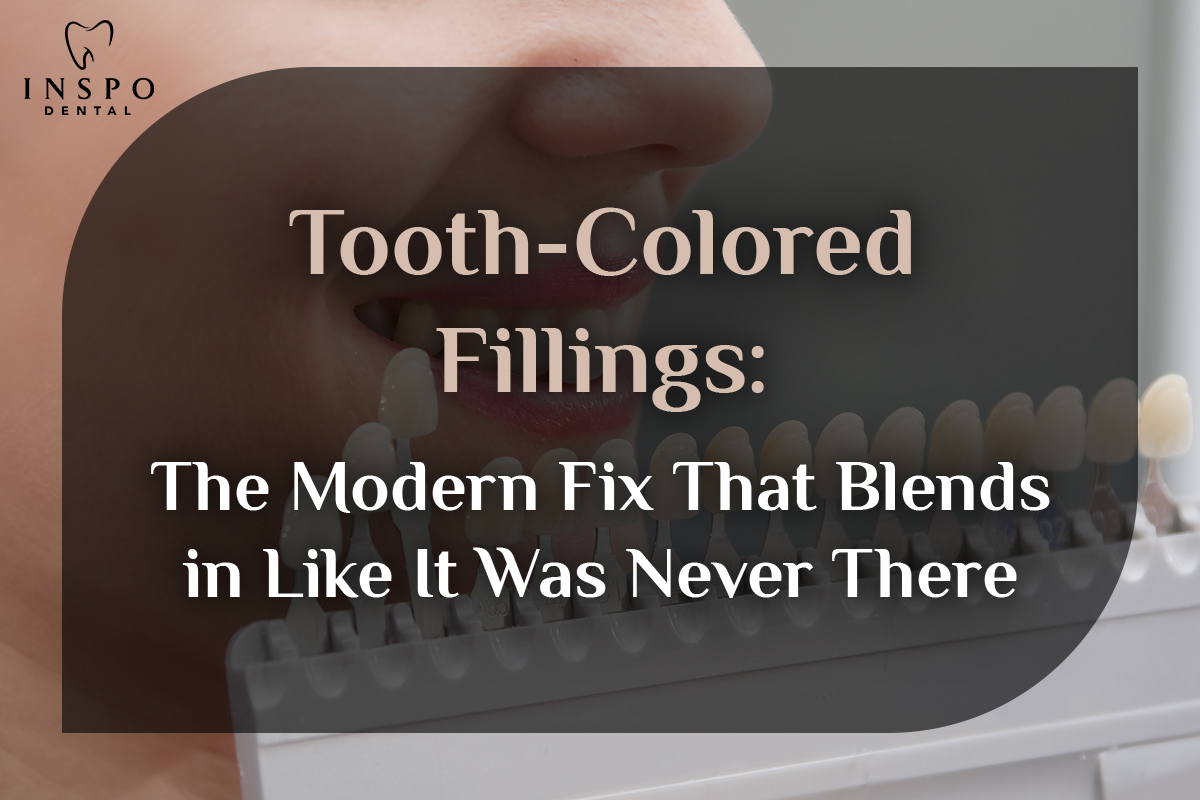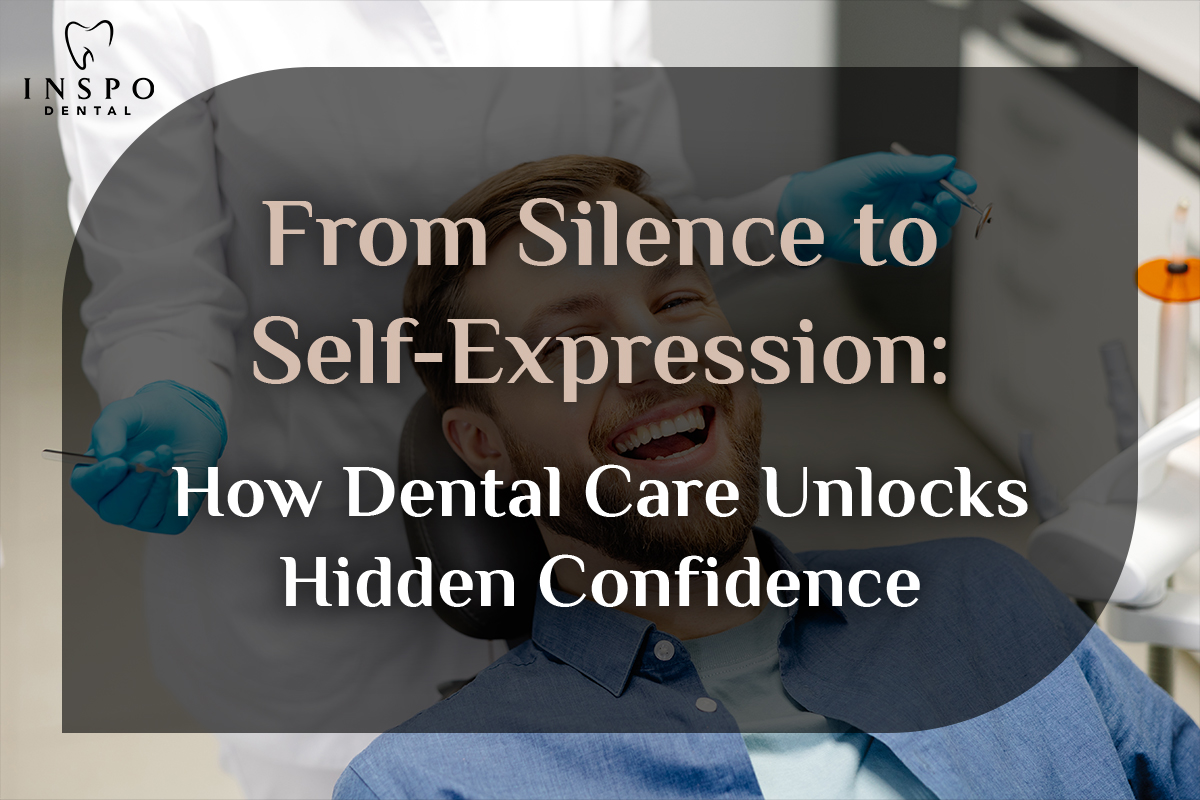Emergency dental care is required when you experience sudden, severe dental problems that cannot wait for a regular dental appointment. Here are common situations where emergency dental care may be necessary:
- Severe Toothache
- If you have a persistent, throbbing toothache that doesn’t subside with pain relievers, it could be a sign of an infection or tooth damage that needs immediate attention.
- Avoid placing aspirin directly on the tooth or gum, as it can burn the tissue.
- Broken, Cracked, or Chipped Tooth
- A tooth can break, crack, or chip due to trauma or biting something hard. If it’s painful or there are sharp edges, it needs immediate attention to prevent further damage or infection.
- Rinse your mouth with warm water and apply a cold compress to reduce swelling.
- Knocked-Out Tooth
- If a tooth gets knocked out (avulsed), it is a dental emergency. You should try to place the tooth back in its socket if possible, holding it by the crown (not the root). If that’s not possible, store the tooth in milk or saline solution and get to a dentist immediately.
- Teeth can sometimes be saved if treated within an hour of the injury.
- Abscess or Dental Infection
- Dental abscesses are infections that can occur in the gum or root of the tooth, leading to pain, swelling, fever, and a foul taste in the mouth. This condition can become life-threatening if not treated quickly, as the infection may spread.
- Seek emergency care to drain the abscess and stop the spread of infection.
- Lost Filling or Crown
- If a filling or crown comes loose or falls out, the tooth can become vulnerable to infection or further damage. Dental cement from a pharmacy can be a temporary solution, but emergency care is needed to properly fix the tooth.
- Broken Braces or Wires
- Broken wires or brackets from braces can cause discomfort or damage to your mouth’s soft tissue. A dentist or orthodontist can help adjust or fix the issue.
- Soft Tissue Injuries
- Injuries to the lips, gums, tongue, or inside of the mouth that result in bleeding or swelling require immediate attention. Clean the area with warm water and apply a cold compress to reduce swelling.
- Uncontrollable Bleeding
- If you experience bleeding in the mouth that doesn’t stop after applying pressure, it’s important to seek emergency dental care. This could be due to trauma, gum disease, or other underlying conditions.
- Partially Dislodged Tooth (Extruded Tooth)
- If a tooth is partially dislodged (but not completely knocked out), it is still considered an emergency. It may cause pain, bleeding, and swelling, and immediate dental care is necessary to reposition and stabilize the tooth.
- In the meantime, apply a cold compress to reduce swelling and take over-the-counter pain relief if necessary.
- Fractured or Broken Jaw
- If you suspect you have a broken or fractured jaw (often caused by trauma), it’s a medical emergency. Symptoms include severe pain, swelling, bruising, and difficulty moving the jaw.
- Stabilize the jaw with a bandage or cloth around the head and jaw, and head to the emergency room immediately.
- Swelling of the Gums or Face
- Swelling can be a sign of an infection or abscess that needs to be treated immediately to prevent the spread of infection. If the swelling is accompanied by fever or difficulty breathing, seek emergency care as this can be a sign of a serious infection.
- Apply cold compresses to manage pain and swelling while you await treatment.
- Loose or Shifting Teeth
- If you suddenly notice that a tooth is loose or shifting out of place, it may be a sign of trauma or advanced gum disease. In either case, emergency dental care is essential to save the tooth or prevent further damage.
- Post-Surgical Complications
- After a dental procedure, such as tooth extraction or surgery, complications like severe pain, heavy bleeding, or infection can arise. If you experience any of these symptoms, seek immediate care from your dentist or oral surgeon.
- Damage to Dental Work
- Broken bridges, veneers, or dentures that cause pain or discomfort also require prompt attention. While not all cases are emergencies, broken dental work can lead to complications if not repaired quickly.
- Allergic Reactions to Dental Materials
- In rare cases, you may have an allergic reaction to materials used in fillings, crowns, or braces. Symptoms may include swelling, itching, and difficulty breathing. If this occurs, seek medical attention immediately.
- Foreign Object Stuck Between Teeth
- If something is stuck between your teeth and you cannot remove it with dental floss, it could cause significant discomfort and even lead to infection or damage to the surrounding teeth or gums. In some cases, an object stuck too deep may damage the gum tissue, making it a dental emergency.
- Try gently flossing the area but avoid using sharp objects like pins or tweezers, which can cause additional damage. If you can’t remove it, seek emergency dental care.
- Injury to the Tongue, Cheeks, or Roof of the Mouth
- If you sustain a deep cut or puncture wound to the tongue, cheeks, or roof of the mouth (palate), this requires emergency treatment, especially if it is bleeding heavily or you are unable to control the bleeding with pressure.
- Rinse your mouth with warm water, apply pressure with sterile gauze, and get to an emergency dentist or emergency room, depending on the severity of the injury.
- Tooth Sensitivity
- While tooth sensitivity alone may not seem like an emergency, sudden or extreme sensitivity to hot, cold, or sweet foods could be a sign of a more serious problem, such as a cracked tooth, exposed nerve, or tooth decay.
- If you experience sharp, sudden sensitivity that doesn’t go away, it’s important to contact your dentist to rule out serious underlying issues.
- Loose or Broken Dental Implant
- A dental implant that becomes loose or broken is a cause for concern, as it could indicate bone loss, gum infection, or improper healing after the implant procedure.
- If your implant feels unstable or is causing discomfort, seek immediate dental attention to avoid further complications.
- Fractured or Dislocated Jaw
- In more severe cases of facial trauma, a fractured or dislocated jaw is a medical emergency that can impact your dental health as well. Symptoms include difficulty moving your jaw, an uneven bite, facial swelling, and jaw pain.
- Immobilize the jaw with a bandage or cloth, and go to the emergency room or call 911. Dental professionals may be involved in treatment once the jaw is stabilized.
- Persistent Bad Breath (Halitosis)
- Persistent bad breath that doesn’t go away even with good oral hygiene may signal an underlying infection, decay, or another serious condition. Though it may not always require immediate emergency attention, chronic bad breath is worth checking with a dentist to identify and treat any potential issues.
- This could be a sign of gum disease, tooth decay, or even systemic health issues that require prompt dental intervention.
- Dental Emergency During Pregnancy
- Pregnant women may be more prone to dental problems due to hormonal changes that affect the gums and oral health. Gum disease or tooth infections can become more serious during pregnancy and require immediate treatment.
- In case of severe toothache, swelling, or infection, seek emergency dental care to protect both your health and the health of the baby. Dentists are typically well-versed in safe treatment options for pregnant patients.
- Emergency After Wisdom Tooth Extraction
- After wisdom tooth extraction, some people may experience complications like dry socket (when the blood clot at the extraction site becomes dislodged). Symptoms include severe pain, bad breath, and an unpleasant taste in the mouth.
- If you experience these symptoms, contact your dentist or oral surgeon for emergency care, as dry socket requires professional treatment to relieve pain and promote healing.
- Trauma from Dental Appliances
- Dentures, braces, and other dental appliances can cause injury or discomfort if they become damaged or don’t fit properly. For example, a sharp edge on a broken denture may cut the inside of your mouth, or a loose bracket from braces can damage the gums.
- In these cases, it’s important to have the appliance repaired or adjusted immediately to avoid further injury or complications.
- Tooth Fracture with Exposed Pulp
- A tooth fracture that exposes the inner pulp of the tooth (the area containing nerves and blood vessels) can be very painful and lead to infection if not treated quickly.
- Immediate emergency dental care is needed to cover the pulp, often requiring a root canal or crown to save the tooth.
- Sinus Pain and Toothache
- Sometimes, sinus infections or pressure can mimic tooth pain, especially in the upper teeth due to their proximity to the sinus cavities. However, if you are experiencing severe tooth pain alongside sinus issues, it could also indicate an underlying dental infection, such as an abscess.
- While mild sinus-related tooth pain may not require emergency care, severe or persistent pain, especially if localized to one tooth, may be a sign of an infected tooth that needs immediate attention.
- Bleeding After Dental Procedures
- It’s common to experience some minor bleeding after a dental procedure, like an extraction. However, if the bleeding continues beyond a few hours, becomes heavy, or you’re unable to stop it by applying pressure with gauze, this can indicate a complication that requires urgent care.
- Excessive bleeding could be a sign of a clotting issue, dislodged clot, or improper healing.
- Chemical Burns in the Mouth
- If you’ve accidentally ingested a corrosive chemical or used a home remedy (like undiluted hydrogen peroxide or harsh teeth whiteners) that causes a burn in your mouth, it can damage your gums, tongue, or other soft tissues.
- Rinse your mouth with water immediately and seek emergency dental or medical care to treat the burn and prevent further tissue damage.
- Burns from Hot Food or Drinks
- Burns to the roof of the mouth or tongue from hot food and drinks (like pizza or coffee) can be painful, and though these burns often heal on their own, severe burns or blistering might need to be seen by a dentist.
- If you develop significant pain or infection in the burn area, it’s essential to seek professional care.
- Broken or Lost Dentures
- If your dentures break or no longer fit properly, this may cause significant discomfort or make it difficult to eat and speak. While not always an immediate emergency, seeing your dentist as soon as possible is important to restore functionality.
- For temporary relief, over-the-counter dental adhesives can help hold dentures in place until professional repair or replacement is possible.
- Trauma from Piercings
- Oral piercings, such as tongue or lip piercings, can sometimes cause trauma or injury, especially if they become infected or if the jewelry breaks or becomes embedded in the tissue. An infection or swelling related to a piercing can be serious, as it can impact breathing or swallowing.
- If you notice swelling, pus, or redness around the piercing, seek medical or dental help promptly.
- Severe Gum Disease (Periodontitis) Flare-up
- Advanced gum disease, or periodontitis, can sometimes flare up, leading to severe pain, swelling, and bleeding in the gums. While periodontitis develops over time, a sudden worsening of symptoms, such as abscess formation or tooth loosening, can constitute a dental emergency.
- Immediate treatment can help manage infection, protect the remaining bone structure, and potentially save your teeth.
- Lodged Objects in the Gums
- If a foreign object, such as a piece of food or debris, becomes lodged in your gums and you can’t remove it with floss or brushing, it may cause irritation, pain, or infection.
- In these cases, seeking emergency dental care to have the object safely removed can prevent further damage to the gums or surrounding teeth.
- Infected Wisdom Teeth (Pericoronitis)
- Wisdom teeth that are partially erupted or impacted can easily become infected, causing a condition known as pericoronitis. Symptoms include swelling, pain, and difficulty opening the mouth. In severe cases, the infection can spread to the jaw or throat.
- If you suspect an infection in a wisdom tooth, prompt dental treatment is essential to reduce pain and prevent further complications, such as spreading infection.
- Pain After Filling or Crown
- It’s normal to experience some sensitivity after getting a filling or crown, but if the pain becomes severe or lasts for more than a few days, it could indicate an issue like improper placement, infection, or a cracked tooth beneath the filling.
- In such cases, a follow-up appointment or emergency visit may be necessary to adjust the filling or crown and address the source of the pain.
- Swelling with Difficulty Breathing or Swallowing
- Swelling in the mouth or face that causes difficulty breathing, swallowing, or opening the mouth should be considered a medical emergency. This could indicate a severe infection, an allergic reaction, or other serious conditions that may compromise your airway.
- Immediate emergency care, often at a hospital, is essential to address the underlying issue and stabilize the condition.
- Signs of Oral Cancer
- Though not typically an “emergency” in the sudden sense, symptoms that may indicate oral cancer, such as unexplained lumps, sores that don’t heal, or persistent mouth pain, should be checked as soon as possible. Early detection significantly improves the chances of successful treatment.
- If you notice any persistent or unusual symptoms, especially those that worsen over time, contact your dentist for an examination.
- Dental Emergencies for Patients with Diabetes
- Patients with diabetes may be at a higher risk for certain dental emergencies, such as infections or gum disease, because elevated blood sugar can affect oral health. If you are diabetic and experience a dental emergency like an abscess or tooth infection, it’s especially important to seek care immediately, as infections can escalate more quickly.
- Managing blood sugar levels and keeping up with regular dental visits can help reduce the risk of emergencies. If you experience any signs of infection, like swelling, pain, or pus, contact a dentist right away.
- Dental Emergencies for People with Heart Conditions
- Individuals with heart conditions or those on blood thinners need to be extra cautious during dental emergencies. Severe toothaches or infections can increase stress on the body, potentially triggering heart-related issues.
- If you are taking blood thinners and experience oral bleeding, it may be difficult to stop the bleeding. Always inform your dentist of your medical conditions so they can manage treatment appropriately. In some cases, collaboration with a cardiologist might be necessary to ensure safe dental care.
- Dental Trauma from Sports Injuries
- Sports injuries are one of the leading causes of dental trauma, especially in contact sports like football, hockey, and boxing. Wearing a custom mouthguard can significantly reduce the risk of chipped, cracked, or knocked-out teeth.
- If you experience trauma during sports, quickly assess the damage and seek emergency care if necessary. For knocked-out teeth, timing is critical—get to the dentist within 30 minutes for the best chance of saving the tooth.
- Discolored Teeth Following Trauma
- After a blow or injury to a tooth, it may start to darken over time, indicating damage to the tooth’s nerve or blood vessels. This is a sign that the tooth is at risk of dying and may require a root canal or other treatment to preserve it.
- If you notice discoloration after a dental injury, even if there’s no immediate pain, contact your dentist to have it examined. Early treatment can often prevent further complications.
- Tetanus Concerns in Dental Injuries
- If a dental injury involves a cut or puncture wound, such as from a fall or biting down on something sharp, tetanus may be a concern, especially if the object that caused the wound was dirty or rusty.
- Ensure that your tetanus vaccinations are up to date, and seek medical attention if there’s a risk of infection. In some cases, a doctor may recommend a tetanus booster after a dental injury.
- Facial or Oral Burns from Electrical Injuries
- Electrical injuries, though rare, can cause serious burns to the mouth or face, particularly in young children who may accidentally bite down on electrical cords or appliances. These burns require immediate medical and dental attention to prevent infection, scarring, or damage to the underlying tissue.
- If an electrical burn occurs, go to the emergency room first for medical evaluation, and then see a dentist to assess any damage to the teeth, gums, or soft tissue.
- Dental Emergencies in Children
- Children often experience dental emergencies while playing, falling, or participating in sports. Common pediatric dental emergencies include knocked-out teeth, broken teeth, and injuries to the gums or lips.
- If a baby tooth is knocked out, it generally isn’t reinserted, but you should still contact a pediatric dentist to ensure that there’s no damage to the underlying permanent tooth. For permanent teeth, quick action is critical, as these teeth can often be saved with prompt treatment.
- Teaching children to wear helmets and mouthguards during physical activities can help prevent many dental emergencies.
- Persistent Pain After Orthodontic Adjustments
- After orthodontic adjustments (such as tightening braces), some discomfort is normal. However, if the pain is severe, persists for more than a few days, or is accompanied by swelling, this could indicate a problem, such as an infected tooth or damaged bracket.
- Contact your orthodontist if the pain continues beyond what’s expected or if any part of the braces is causing injury to the inside of the mouth.
- Allergic Reactions to Dental Anesthesia or Materials
- Though rare, some people may have allergic reactions to materials used in dental treatments, such as local anesthesia, latex gloves, or certain metals used in fillings and crowns. Symptoms can include swelling, difficulty breathing, and rash.
- If you experience any signs of an allergic reaction during or after a dental procedure, seek immediate medical attention. Make sure to inform your dentist of any known allergies beforehand so they can take the necessary precautions.
- Denture-Related Emergencies
- For denture wearers, emergencies can include a cracked or broken denture, which can leave you unable to eat or speak comfortably. If this happens, avoid trying to repair the denture yourself as it could cause further damage or make it unusable.
- Instead, contact your dentist for an emergency appointment to have the denture repaired or replaced. Some offices offer same-day denture repair services.
- Swallowed Dental Objects
- It’s possible, though uncommon, to accidentally swallow dental items such as crowns, braces wires, or even teeth. If this happens, it’s usually not an immediate emergency unless the object is sharp or large, which could cause damage to the digestive tract.
- If you suspect you’ve swallowed something sharp or feel discomfort in your throat or stomach, seek medical attention right away. Your doctor may perform an X-ray or other imaging tests to locate the object.
- Broken or Loose Retainers
- Retainers, like other orthodontic appliances, can sometimes break or become loose, which may lead to discomfort or even the risk of teeth shifting out of place. This might not be a medical emergency, but it’s important to address it promptly, especially if you’re still in the active phase of orthodontic treatment.
- Contact your orthodontist for advice on how to proceed or schedule an emergency visit to get your retainer fixed or replaced.
- Oral Infections from Wisdom Teeth
- Impacted or partially erupted wisdom teeth can be prone to infection, especially if food or bacteria become trapped in the gums around the tooth. Signs of an infection include pain, swelling, bad taste in the mouth, and difficulty opening the mouth.
- Pericoronitis, an infection around a partially erupted wisdom tooth, is a common dental emergency. If you experience these symptoms, prompt treatment is necessary to prevent the infection from spreading and causing further complications.
Tips for Managing Dental Emergencies When Traveling
- Carry Emergency Supplies: When traveling, especially abroad, it’s a good idea to carry some basic dental emergency supplies, such as pain relievers, dental cement, and gauze.
- Know Local Emergency Numbers: Make sure you know how to contact emergency dental services or find a local dentist in your destination.
- Temporary Fixes: If a dental emergency occurs while traveling, you may need to use temporary solutions, such as applying dental cement for a lost crown or filling, until you can see a dentist.
How to Access Emergency Dental Care
If you experience any of the situations mentioned above, it’s important to know how to access emergency dental care:
- Contact Your Dentist: Most dental practices offer emergency appointments or after-hours care. If your regular dentist is unavailable, their office may provide recommendations for emergency care.
- Emergency Dental Clinics: Many cities have emergency dental clinics that offer same-day appointments for urgent care. These clinics are typically equipped to handle most dental emergencies.
- Hospital Emergency Room: For severe dental trauma, facial injuries, or infections that spread to the face or neck, you may need to go to a hospital emergency room. While ER doctors are not equipped to handle all dental procedures, they can provide antibiotics or pain relief and refer you to an emergency dentist.
Costs of Emergency Dental Care
- Insurance Coverage: If you have dental insurance, check your policy to see what is covered under emergency dental care. Many insurance plans cover at least part of the cost of emergency treatment.
- Out-of-Pocket Costs: If you don’t have dental insurance, emergency care can be expensive, especially for procedures like root canals, extractions, or surgery. Some dental offices offer payment plans or financing options to help manage the cost.
Tele-Dentistry for Emergencies
- Remote Consultation: Some dentists offer tele-dentistry services, where you can consult with a dentist via phone or video chat. While this won’t replace in-person treatment, it can help you assess the severity of your situation and provide guidance on what to do until you can receive proper care.
In any dental emergency, time is critical. Acting quickly and contacting a professional can prevent long-term complications and save your teeth or oral health from further damage.






